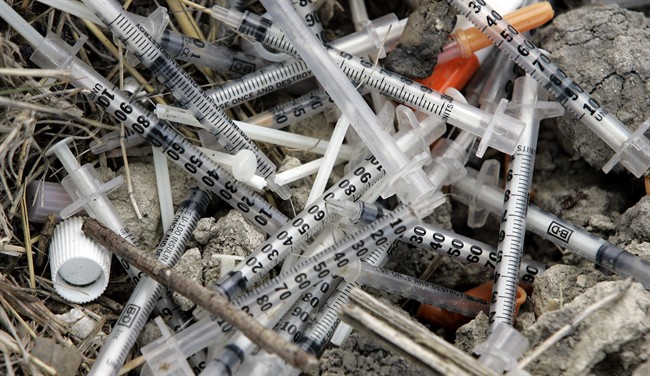A municipality in British Columbia’s Fraser Valley is defending an eight-year-old bylaw that has prevented health officials from offering harm-reduction services to drug users, suggesting the provision doesn’t, in fact, ban programs such as clean-needle distribution.

A group of three drug users filed a lawsuit against the City of Abbotsford in May, alleging the bylaw violates their constitutional rights because it prevents them from accessing services that could prevent overdoses and diseases such as hepatitis.
The City of Abbotsford has filed a statement of defence in B.C. Supreme Court, suggesting the bylaw doesn’t prevent the local health authority from offering services to drug users, while also noting several community groups already distribute clean needles in the community.
“The bylaw does not restrict (the Fraser Health Authority) from using land within the boundaries of (Abbotsford) for all activities that are directed to addressing adverse medical outcomes associated with the consumption of illicit drugs,” says the response to civil claim, filed on July 2.
“Harm reduction measures, including needle exchange, are and have been provided by agencies other than the (health authority) within the territorial jurisdiction of (Abbotsford),” the document continues.
Community groups have been quietly contravening the bylaw for years, passing out clean needles, crack pipes and other supplies, without any attempts by the city to stop them, though Fraser Health has repeatedly insisted it cannot launch a needle distribution program with the bylaw still in place.
The statement of defence appears to suggest the bylaw may not represent a blanket ban on harm-reduction services — an assertion that would be at odds with the city’s own public statements about the bylaw.
When the bylaw was passed in 2005, councillors at the time made it clear they were changing the city’s zoning rules to prevent harm-reduction services like those offered in Vancouver from appearing in their community.
The change was introduced amid the debate over the controversial supervised-injection site opened in Vancouver two years earlier, though the Abbotsford bylaw includes all forms of harm reduction.
The city launched a review of the bylaw in 2010, at the request of Fraser Health, and several staff reports and reviews prepared as part of that review clearly state the purpose of the bylaw is the “prohibition of needle exchanges, mobile dispensing vans, safe injection sites and other similar uses” in all zones of the city.
Neither Abbotsford Mayor Bruce Banman nor the city’s lawyer responded to messages seeking clarification.
In its response, the city denies the bylaw violates the rights of drug users, but says even if it does, such a violation would be justifiable.
“The provisions of the bylaw relating to harm-reduction use are directed to promoting the orderly, efficient and reasonable use of land within the defendant’s boundaries,” the document says.
The lawsuit was launched by Douglas Smith, Nadia Issel and Diana Knowles, who all live in Abbotsford and use injection drugs. The B.C./Yukon Association of Drug War Survivors is also a plaintiff.
Their lawyer, Scott Bernstein of Pivot Legal Society, said he’ll be asking the city to clarify its arguments, though he said he was surprised the city appears to be downplaying the scope of the bylaw. At the very least, he says the city’s court submission is vague.
“Why is the bylaw there in the first place?” Bernstein said in an interview Friday.
“If it’s not actually doing what it says, then what’s the point? Is it just to harass people who use drugs or to scare off organizations?”
The city began reviewing the bylaw three years ago and has since ordered a series of studies and public consultations.
The Fraser Health Authority presented a plan to the council last year that proposed phasing in a needle-exchange program over several years.
The agency has said such a program is needed in a community with some of the province’s highest rates of overdoses and infections of HIV and hepatitis C.
In March, council directed city staff to prepare a draft bylaw that would remove the harm reduction ban, though it’s not clear when it will return to council for debate or a vote.
A public hearing on the issue is expected in the fall.



Comments